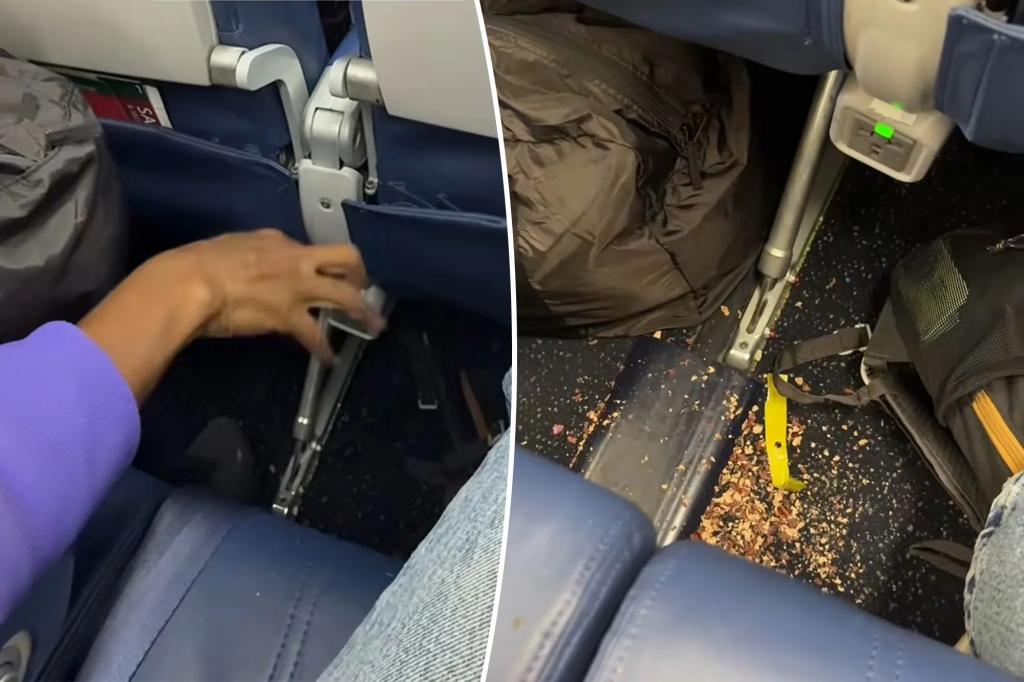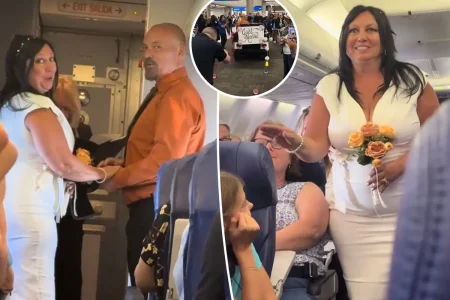Air Travel Etiquette: When Seat Neighbors Cross the Line
In a recent incident that has sparked widespread discussion on social media, a woman’s shocking airplane behavior has highlighted the often blurry boundaries of travel etiquette. TikTok user Olivia shared her bewildering experience aboard a flight where her seat neighbor engaged in what many would consider inconsiderate behavior—peeling nuts and discarding the shells directly onto the cabin floor. This scenario, which goes far beyond common airplane annoyances like reclined seats or open window shades, raises important questions about respect, cultural differences, and passenger responsibility in shared spaces.
Olivia’s experience unfolded while she was asleep for most of the incident. Upon waking from her nap, she was confronted with a disturbing sight: the floor around her seat neighbor was littered with nut shells. “Just realized that the woman next to me on my flight is peeling nuts and just throwing them on the floor,” Olivia explained in her viral TikTok post. Though she eventually asked the woman to stop this behavior, she lamented that her intervention came too late, as the damage was already done. “These poor flight attendants,” she added, expressing sympathy for the crew members who would inevitably be tasked with cleaning up the mess. The post quickly gained traction, with viewers equally appalled by what they saw as a flagrant disregard for basic courtesy in a confined public space.
The community response to Olivia’s video revealed complex perspectives on this unusual situation. Many commenters expressed outrage, pointing out that beyond being untidy and disrespectful, consuming nuts on an airplane presents a serious health risk to passengers with severe allergies. “I know people with life-threatening allergies to nuts. It’s not just gross and disrespectful, it’s dangerous,” one commenter observed. Others responded with humor to mask their disbelief: “I’m convinced people are being released from institutions without warning the public.” Some viewers took a more practical approach, suggesting that airlines should implement financial penalties for passengers who demonstrate such disregard for cleanliness and safety protocols. “People should get fines for being so disrespectful on planes. That is ridiculous for so many reasons!” wrote one commenter, reflecting a sentiment that inconsiderate behavior should have consequences.
Interestingly, the incident sparked a cultural debate among viewers, with some defending the woman’s actions as culturally normal behavior. “It’s a cultural thing. It’s their culture,” stated one commenter matter-of-factly, while others specifically mentioned, “This is normal in Islam” and “It’s normal in India.” These comments introduce a nuanced dimension to the discussion—the intersection of cultural practices and universal expectations in international travel. While certain behaviors may indeed be acceptable or common in specific cultural contexts, commercial air travel represents a global space with its own established norms and requirements. Airlines typically have clear policies about waste disposal and food consumption, designed to maintain hygiene, safety, and comfort for all passengers regardless of their cultural backgrounds.
The incident also prompted discussion about passenger assertiveness and the responsibility to speak up when faced with problematic behavior. Some commenters criticized Olivia for not intervening sooner: “Open your mouth, girl! Normalize speaking up. What f*cking happened to ppl?? Jesus,” wrote one particularly passionate viewer. Another suggested a more public approach: “Call the attendant and say OUT LOUD what is happening.” These comments reflect a common frustration with the reluctance many people feel when confronting uncomfortable situations in public. The hesitation to create conflict, especially in confined spaces like airplane cabins where everyone must coexist for hours, often leads passengers to tolerate behaviors they find objectionable rather than addressing them directly.
This incident ultimately serves as a microcosm of larger social questions about shared spaces, cultural sensitivity, and communication in our increasingly interconnected world. Air travel, by its nature, brings together people from diverse backgrounds and expectations into extremely close quarters, creating a unique social environment where etiquette becomes especially important. While airlines establish basic rules and flight attendants oversee cabin operations, the responsibility for creating a respectful environment ultimately falls on passengers themselves. As travel continues to become more accessible globally, incidents like this one highlight the ongoing need for thoughtful conversation about how we navigate cultural differences while maintaining common standards of courtesy and safety. Whether through clearer airline policies, more assertive passenger communication, or greater cultural awareness, finding the balance between personal freedom and collective responsibility remains an essential challenge of modern travel.















